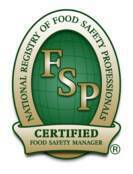The link below will help you prepare you for the Food Safety Exam.
This is not the actual exam and is intended for practice use only. Exam was prepared by #1 Choice For Manager's Certification. Exam answers are our professional opinion only and should not replace the training needed to pass the actual exam.
FREE Food Safety Practice Exam
#1 Choice For
Manager Certification
1-888-771-7871
To Login
Username: Pass
Password: Test


509.049, Florida Statutes
INDUSTRY BULLETIN for Florida’s Foodservice Industry SUBJECT: Food Service Employee Training and Food Safety Certification
This bulletin is provided to aid in compliance with Florida law, and is not intended to be legal advice. While care has been taken to ensure its accuracy, in the event of conflict the actual statute or administrative rule will control. All food service employees of establishments licensed by the Department of Business and Professional Regulation must receive specific food safety training as required in section 509.049, Florida Statutes. Additionally, all food service managers responsible for the storage, preparation, display, or serving of foods must have passed an approved test demonstrating knowledge of basic food protection practices, and received a certificate attesting thereto, pursuant to 509.039, Florida Statutes.
FOR ALL DBPR LICENSED PUBLIC FOOD SERVICE ESTABLISHMENTS Each food service employee must receive Food Safety Certification training every three years using a DBPR approved program. All Operators must provide proof of employee food safety training upon request at the time of inspection. Proof of training for each food service employee must include: 1) name of the trained employee; 2) date of birth of the trained employee; 3) date the training occurred; and 4) approved food Safety Certification training program used. If you do not have your own inhouse approved proprietary program approved by the division, you must produce upon request of the division, original certificates as proof of training. The establishment may designate any certified food service manager to conduct the approved training program. A food safety training program approved by DBPR prior to September 1, 2004, must be used.
FOR ALL “THIRD PARTY PROVIDERS” OF FOOD SAFETY EMPLOYEE TRAINING “Third party providers” as defined in section 509.013(10) Florida Statutes, means any provider of a DBPR approved food safety training program that provides training or a training program to a public food service establishment not under common ownership or control with the provider. Third-party providers shall issue to a public food service establishment an original certificate for each employee certified by the provider and an original card to be provided to each certified employee. Each card or certificate shall be produced by the certified food service employee or the public food service establishment, respectively, in its duly issued original form upon request of the division. Photocopies are not acceptable, and may violate copyright provisions. All food service employee training performed using a DBPR approved third party provider program or any training service which uses a DBPR approved third party provider program must be reported electronically to DBPR, in a format prescribed by DBPR, within 30 days of the certification or re-certification. The following information must be reported: name of the certified food service employee; employee’s date of birth; name of the food service establishment; name of the certified food manager who conducted the training; date the training occurred; and date the employee food safety training 3-year certification expires.
“IN-HOUSE” PROPRIETARY TRAINING REPORTING EXEMPTION A food service establishment training its own employees using its own in-house proprietary DBPR-approved program and using its own certified food manager(s) to provide the training is exempt from electronic reporting as well as the card and certificate requirements.
FOOD SERVICE EMPLOYEE TRAINING REMINDER Food service employees of DBPR licensees must be certified every three years. Now is the time to verify your employees are in compliance. Violations can result in administrative penalties, including fines and license suspension or revocation.
